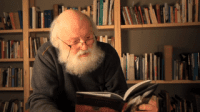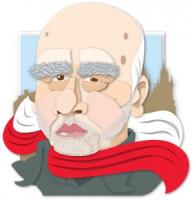June 18, 2012
Edited by David Sanders
Specimen Days
June 18, 2012
1552 – Gabriello Chiabrera, Italian poet (d. 1637), is born.
1588 – Robert Crowley, English printer and poet, is born.
1749 – Ambrose Philips, English poet (b. 1674), dies.
1853 – Branko Radicevic, Serbian poet (1st Serbian Uprising), dies.
1863 – George Essex Evans, Australian poet (d. 1909), is born.
1932 – Geoffrey Hill, English poet, is born.
 The scummed pond twitches. The great holly-tree,
The scummed pond twitches. The great holly-tree,
Emptied and shut, blows clear of wasting snow,
The common, puddled substance: beneath,
Like a revealed mineral, a new earth.
—Geoffrey Hill, from “In Piam Memoriam”
Poetry In The News
Primary School Children to be Expected to Learn and Recite Poetry
Children as young as five will be expected to learn and recite poetry by heart in a major overhaul of the national curriculum for schools in England. The education secretary, Michael Gove, will promise a new focus on the traditional virtues of spelling and grammar when he sets out his plans for the teaching of English in primary schools later this week. At the same time, Gove will put forward proposals to make learning a foreign language compulsory for pupils from the age of seven. Read more at the Guardian.
Come and Scribble on Wordsworth’s Walls – Courtesy of the National Trust
 Imagine walking into the former home of poet William Wordsworth, run by the National Trust, with dirty boots, a dog and taking your children along. You are allowed to sit in all those chairs that normally have a Do Not Sit On This Chair notice on them, you can play the piano in the lobby without being shouted at and your children can happily run riot through the 19th century home. Oh, and if you or your children want, you can write on the walls. Read more at the Guardian.
Imagine walking into the former home of poet William Wordsworth, run by the National Trust, with dirty boots, a dog and taking your children along. You are allowed to sit in all those chairs that normally have a Do Not Sit On This Chair notice on them, you can play the piano in the lobby without being shouted at and your children can happily run riot through the 19th century home. Oh, and if you or your children want, you can write on the walls. Read more at the Guardian.
The Ink-smudged Diaries of Adrienne Rich
It is April 12, 2012, a month before the President’s declaration in favor of same-sex marriage, and a group of students are gathering at the Harvard College Woman’s Center to read poetry. They pass around pillows and hunks of bread as they take turns reading aloud from glossy books. They are here to commemorate Adrienne C. Rich ’51, whose death on March 27 marked the passing of one of the twentieth century’s most compelling and controversial poetic voices. “Her life follows the trajectory of important thought and social moments, it’s amazing,” said Cassandra Euphrat Weston ’14, who co-organized the event along with Jia H. Lee ’12. “It’s a testament to her, not to coincidence, but to her that she was in the forefront personally and politically.” Read more at The Harvard Crimson.
World Poetry
Oman Detains Poet, Blogger Amid Growing Discontent
Early this year, Monaco’s foreign-affairs department couriered a letter with a pressing request to the principality’s head of cultural affairs: Could he rustle up a local poet? The government needed one to participate in London’s Cultural Olympiad, an arts festival that will coincide this summer with the 2012 Olympic Games. This two-square-kilometers of coastline on the French Riviera is one of only nine nations that hasn’t been able to produce a poet to take part in the London event. Read more at the Wall Street Journal.
New Books
Long Division: Poems by Alan Parker
 [Paperback] Tupelo Press, 80 pp., $16.95
[Paperback] Tupelo Press, 80 pp., $16.95
In his seventh poetry collection, Alan Michael Parker aims to surprise. Recombining lists, fables, and mathematical equations, Long Division is formally playful, wielding irony as a lever of political resistance. Here is a writer fascinated by comedy, by sadness, and by the unexpected ways that poetry makes both conditions possible at once. When was the last time you laughed out loud reading poems? Parker’s new work is truly funny, exposing the impossibility of realism in a world where imagination is more trustworthy than experience.
Jade Ladder: Contemporary Chinese Poetry edited by W. N. Herbert
[Paperback] Bloodaxe Books Ltd., 320 pp., $26.95
Jade Ladder is the most comprehensive single volume guide to what has been happening and what is happening now in a culture of undeniably global significance. It is indispensable reading for anyone with an interest in the future not just of China, but of poetry.
Thirty Poems by Robert Walser
 [Hardcover] New Directions, 64 pp., $20.95
[Hardcover] New Directions, 64 pp., $20.95
In a small, exquisite clothbound format resembling the early Swiss and German editions of Walser’s work, Thirty Poems collects famed translator Christopher Middleton’s favorite poems from the more than five hundred Walser wrote. The illustrations range from an early poem in perfect copperplate handwriting, to one from a 1927 Czech-German newspaper, to a microscript.
Recent Reviews
Selected Poems by Anthony Hecht
by Diann Blakely
The most Shakespearean poet of America’s twentieth century, Anthony Hecht wrote his best work while raging on history’s wind-scarred heath. More personally, he saw first-hand the world’s “brute, inexplicable inequities” as a soldier present at an Auschwitz annex’s liberation, then as a helplessly caring and overburdened husband trapped in domestic wars. Read more at Goodreads.
Le Spleen de Poughkeepsie
by Donna Stonecipher
In Joshua Harmon’s second book of poems, Le Spleen de Poughkeepsie, there is an eager dwelling upon appearances, an engrossment in surfaces: the book is an enactment of Geertz’s aesthetic perspective on life as applied to the ugly—degraded, impure, deeply compromised—surfaces of Poughkeepsie, New York. Read more at Rain Taxi.
“Unseen Hand” by Adam Zagajewski
 by Joseph Campana
by Joseph Campana
What’s poetry anyway? Confession or toy, moral signpost or elaborate game? To answer for Adam Zagajewski, poetry would be the unanticipated dividend of exile, which is wisdom. Dislocation has been at the heart of Zagajewski’s work for decades. His latest collection, Unseen Hand, translated from the Polish by Clare Cavanagh, travels the border between coming and going, melancholy and joy. Read more at the Houston Chronicle.
Review: The Sin-eater: A Breviary
by Seth Amos
In his “Introit,” Thomas Lynch writes, “If the English master, Auden, was correct, and ‘art is what we do to break bread with the dead,’ then the Irish master, Heaney, was likewise correct when he suggests that ‘rhyme and meter are the table manners.’” I’m sure Lynch fully understood the truth in these quotes as they relate to The Sin-eater: A Breviary, but these words perfectly set you up for Argyle and his hunger for iniquities. In the book’s twenty-four poems, Lynch not only breaks bread with the dead, he guzzles their beer. This may seem an irreverent gesture, for Lynch only half listened to Heaney’s words. Read more at Dark Sky Magazine.
Correspondences
Hearing Voices: Women Versing Life Presents Janice N. Harrington
 by Patricia Caspers
by Patricia Caspers
As a poetry editor at Prick of the Spindle, I find that poems about certain subjects, such as childhood, love, aging, and death, often lean too heavily on nostalgia, so that the language limps. In fact, I’ve been guilty of writing my own nostalgic poems now and again— and again. Hey, nobody said this poetic life was going to be easy, which is why the first time I heard Janice N. Harrington read from her book, The Hands of Strangers: Poems from the Nursing Home I was struck by her ability to write about her subject— the lives of the elderly and those who tend to them— with frank grace: “Scraped, scratched,/pierced by roughness, old women split/ as easily as sun-scalded plums.” Read more at Ploughshares.
T. S. Eliot, The Art of Poetry No. 1
by Donald Hall
The interview took place in New York, at the apartment of Mrs. Louis Henry Cohn, of House of Books, Ltd., who is a friend of Mr. and Mrs. Eliot. The bookcases of the attractive living room contain a remarkable collection of modern authors. On a wall near the entrance hangs a drawing of Mr. Eliot, done by his sister-in-law, Mrs. Henry Ware Eliot. An inscribed wedding photograph of the Eliots stands in a silver frame on a table. Mrs. Cohn and Mrs. Eliot sat on a sofa at one end of the room, while Mr. Eliot and the interviewer faced each other in the center. The microphone of a tape recorder lay on the floor between them. Read more at The Paris Review.
Broadsides
Books by Their Covers: Best Poetry Presses, by Design by Sean Bishop
by Sean Bishop
Here’s some Not-News-To-Anyone: poetry doesn’t sell itself. Successful first books, in particular, depend on a poet’s overall visibility online, a real-world group of friends and friends-of-friends to assist in writing and publishing reviews, the poet’s willingness to go on a thankless monetary sinkhole of a cross-country “tour” with several other poets packed in the back of a beat-up 1997 Honda Civic with no a/c, and last but not least: the artwork and design of the book itself. Is it pretty? Would it look good on your pillow? Read more at Ploughshares.
Poetry Should Be Subversive
by Simon Armitage
If businessman and philanthropist Scott Griffin committed a misdemeanour as a young boy, he was sent to his room and not allowed out until he had read and remembered some piece of classical poetry. Scott now presides over what is sometimes described as the world’s richest poetry award, the Griffin prize, with prize money totalling 200,000 tax-free Canadian dollars. The psychology by which an intended punishment became a lifelong passion might only be explained by a close analysis of that particular father and son relationship; but in any event, poetry (or at least a few poets each year) is certainly better off because of it. Yet I’ve also seen the reverse happen. Read more at the Guardian.
Drafts & Fragments
3-year-old Recites Poem, “Litany” by Billy Collins
Here he is.
Envoi: Editor’s Notes
Funhouse Mirrors
Susceptibility (as Opposed to Sincerity): Ariel Goldberg on Kay Ryan
by Lucas de Lima
. . . Ryan’s affect of sincerity is so convincing that she earns the very privilege of shedding her subjectivity. She appears to her many admirers as ‘unmediated’ and ‘uncensored’ as any of the New Sincerests. In fact, the poet is elevated to the status of a disembodied feeling that is sincere to a fault, not postmodern in the least: there is no interest in revealing or recognizing power structures here. In her rejection of the personal and specific as frames, Ryan ends up siding with heterosexism when she intentionally filters queerness out. Read more at Montevidayo.
While I’m not sure what much of this means, exactly, I have to concur with the general sentiment regarding Kay Ryan’s attempts to filter queerness out of her poetry. And I want to add my own piece to this quarrel by suggesting that the poems of Mary Oliver (Maple Heights), Richard Howard (Cleveland), and Hart Crane (Garrettsville) are insufficiently Ohioan. What normative structure are they appealing to in their work by dismissing the place of their birth?
Too often we are so married to our own identities that we don’t permit others to have theirs without denigrating them or rejecting them outright. If poetry, or art, or love exists in order to provide an inflated, congratulatory view of our reflected selves instead of the possibility of communion, then what damn good is any of it?
—David Sanders